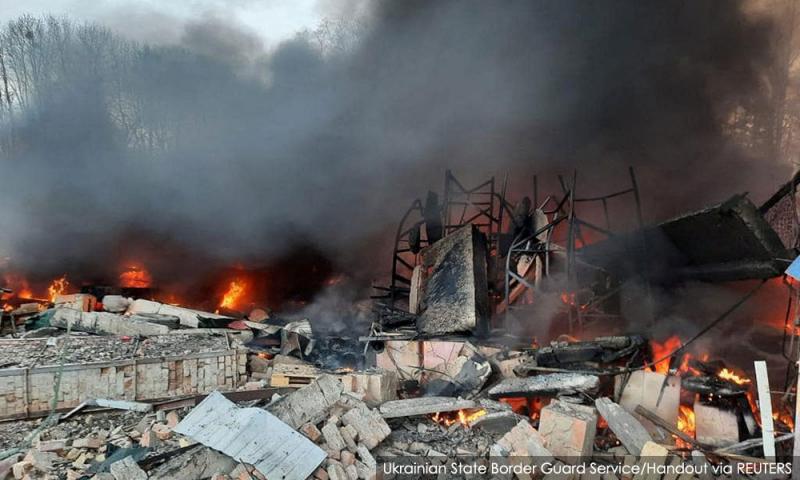LETTER | The Russia-Ukraine conflict has turned into an armed conflict despite efforts to resolve it through diplomacy. I wish diplomacy was given more time to prevent war, but do not despair, diplomacy works even in the midst of war, provided there is political will, which unfortunately now seems warring parties lack.
Who started the war and whether this war is legal or not are questions that are beyond the scope of this write-up. The immediate concern is whether the warring parties will abide by the law of armed conflict, widely known as international humanitarian law (IHL).
IHL is a special branch of public international law that applies in times of armed conflict. It consists of a set of rules, which seek, for humanitarian reasons, to limit the effects of armed conflict to protect people who are not or are no longer taking part in hostilities and restrict the methods and means of warfare employed.
These rules, which contain the four Geneva Conventions of 1949, customary international law, and other relevant international treaties, obligate the warring parties to abide by the principles of distinction, precaution, proportionality and humanity.
Civilians and civilian objects enjoy target immunity, not to be the subject, or be the sole objects, of a military attack. Civilians are persons who are not members of any armed force or group, and who do not take a direct part in the hostilities.
The IHL protects them. It provides special protection to the most vulnerable population including women and children. However, civilians who directly participate in the hostilities lose their target immunity and, like military personnel, they can be targeted just to disable them to fight.
In “levée en masse” situations where civilians spontaneously take up arms and resist an invasion, these civilians are “combatants”, and are entitled to prisoners of war (POWs) status if captured, provided they carry their arms openly, distinguish themselves from the general population and conduct their operations in accordance with the rules of IHL.
Warring parties are required not to conduct their military operation indiscriminately. Launching “an indiscriminate attack affecting the civilian population or civilian objects in the knowledge that such attack will cause excessive loss of life, injury to civilians or damage to civilian objects,” constitutes a grave breach of IHL, and thus should, by taking precaution and by following the principle of distinction, be avoided.
IHL allows targeting military objects, i.e., “objects which by their nature, location, purpose or use make an effective contribution to military action and whose total or partial destruction, capture or neutralisation, in circumstances ruling at the time, offers military advantage.”
Any armed attack, which cannot be justified by military necessity or cannot contribute to the military defeat of the “enemy”, or causes excessive loss of civilian lives or destroys civilian objects should be avoided.
The wounded and sick must be “respected” and “protected”, as they are hors de combat (out of action) or just need special medical attention. To respect means to spare, not to attack, not to kill or ill-treat or in any way harm a fallen and unarmed soldier. To protect means “to come to someone’s defence, to lend help and support and to provide all the necessary care as the situation requires.”
In some contemporary war fronts, wounded soldiers are killed, but the assassins tried to justify their inhumane behaviour by invoking so-called “battlefield mercy killing”. Killing a defenceless hors de combat is unlawful, unjust, immoral and a war crime. There is no mercy in murdering a defenceless hors de combat.
When combatants are captured or surrendered to an “enemy” power in an international armed conflict, such as the Russia-Ukraine war, they become POWs who are entitled to humane treatment.
They can be interrogated but are not required to give anything except name, surname, rank, date of birth and serial number, or equivalent information, and their home government must be informed about their captivity.
In case there is doubt as to whether a particular captive is entitled to treatment as a POW, the captive shall be treated as such until the status of the person detained has been determined by a properly constituted tribunal.
The International Military Tribunal in Nuremberg in 1946 stated that “war captivity is neither revenge nor punishment but solely protective custody, the only purpose of which is to prevent the POW from further participation in the war.”
Justice O'Connor of the Supreme Court of US has pointed out that a POW “is not a convict; his imprisonment is a simple war measure…” and “must be removed as completely as practicable from the front, treated humanely and in time exchanged, repatriated or otherwise released.”
In other words, POWs can be released via arrangement in wartime, or held until the end of the conflict and released unconditionally.
It is hoped that the warring parties in the Russia-Ukraine war will abide by the IHL rules. They must not cause excessive civilian casualties, destroy civilian objects, places of worship, or cultural monuments, respect and protect the wounded and sick, treat POWs humanely and allow the International Committee of the Red Cross (ICRC) and other relief organisations to carry out their humanitarian works without harm.
It is also hoped that the warring parties will stop fighting and resolve their differences through diplomatic means or any other means of their choice until then let the war be ruled by law.
MOHAMMAD NAIQB EISHAN JAN is a professor at the Ahmad Ibrahim Kulliyyah of Laws, International Islamic University of Malaysia.
The views expressed here are those of the author/contributor and do not necessarily represent the views of Malaysiakini.
Biden hits Russia with new sanctions for 'premeditated' Ukraine attack
EU says 'Putin must and will fail' as it agrees new sanctions
Explosions heard in Kyiv, official says enemy aircraft downed
Explainer: The new US export rules designed to freeze Russian tech
Biden takes veiled swipe at China in condemning Russia backers on Ukraine
Ukraine ambassador to M'sia hits out at Putin over needless bloodshed





